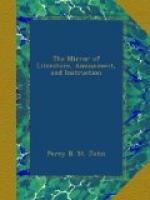I have knelt at the shrine of a Donna,
And languish’d for months
in her train,
But still I was whisper’d by honour,
And came to my senses again,
When I thought of the vows I had plighted,
And the stars that I once
used to call
As my witnesses—could I have
slighted?
Her I long to behold at the
Ball.
You say that my nature is altered,
“I’ve forgotten
the how and the when,
That my voice which was best when it faltered”
Is rough by my converse with
men:
Believe me that still you will find me
Of lovers the truest of all,
And the spell that has bound still shall
bind me,
And I’ll come, dearest
girl, to your Ball.
I have waded through battle fields gory,
To my country and honour been
true,
And my name has been famous in story,
But dear Emma, it all was
for you.
I’ve longed when my troubles were
over,
Unhurt by the bay’net
or ball.
To forget I was ever “a rover,”
And claim you my bride at
your Ball.
Clarence.
* * * * *
The SANJAC-Sherif, or standard of Mahomet.
(For the Mirror.)
This standard, which is an object of peculiar reverence among the Mussulman, was originally the curtain of the chamber door of Mahomet’s favourite wife. It is kept as the Palladium of the empire, and no infidel can look upon it with impunity. It is carried out of Constantinople to battle in cases of emergency, in great solemnity, before the Sultan, and its return is hailed by all the people of the capital going out to meet it. The Caaba, or black stone of Mecca is also much revered by the Turks; it is placed in the Temple, and is expected to be endowed with speech at the day of judgment, for the purpose of declaring the names of those pious Mussulmen who have really performed the pilgrimage to Mecca, and poured forth their devotions at the shrine of the prophet. Ina.
* * * * *
Eating.
Abridged from Mr. Richards’s Treatise on Nervous Disorders.
The object of eating ought not to be, exclusively, the satisfying of the appetite. It is true that the sensation of hunger admonishes us, and indeed, incites us to supply the wants of the body; and that the abatement of this sensation betokens that such want has been supplied; so far the satisfying of the appetite is a matter of consideration; but a prudent person will observe the mode in which the appetite is best satisfied, and the frame, at the same time, most abundantly nourished, for this ought to be the chief object of feeding. There is much truth in the homely adage, that “what is one man’s meat is another man’s poison,” and a person who has been muscled[1] will, if he wishes to enjoy his health, rigidly eschew that piscatory poison. So, also, will an individual with a bilious habit avoid fat pork; and those whose stomachs are flatulent will not inordinately indulge in vegetables. Captain Barclay, whose knowledge in such matters was as extensive as that of most persons, informs us that our health, vigour, and activity must depend upon our diet and exercise.




